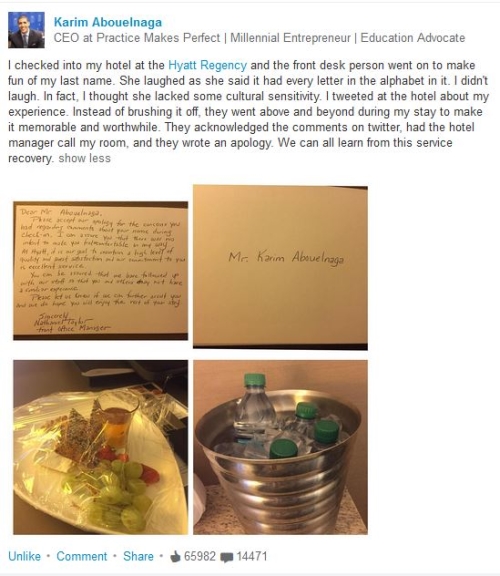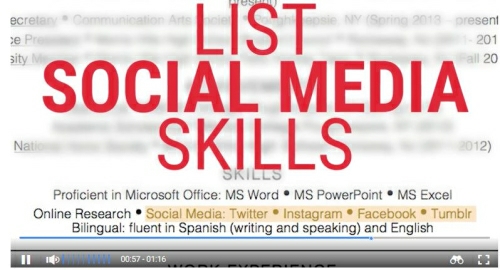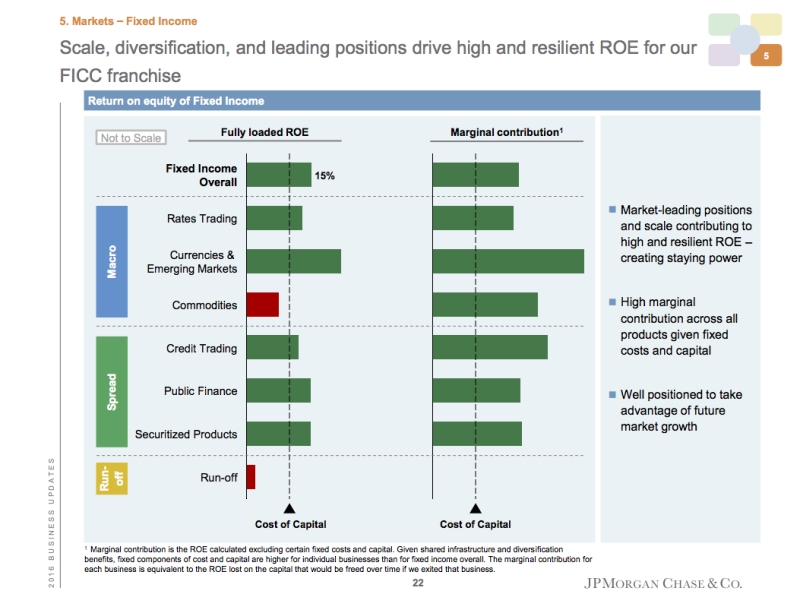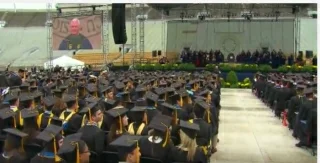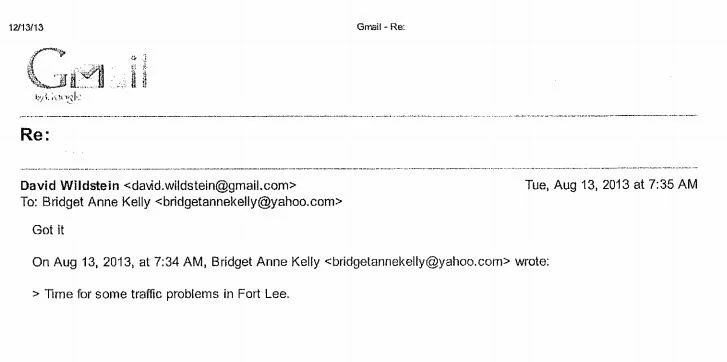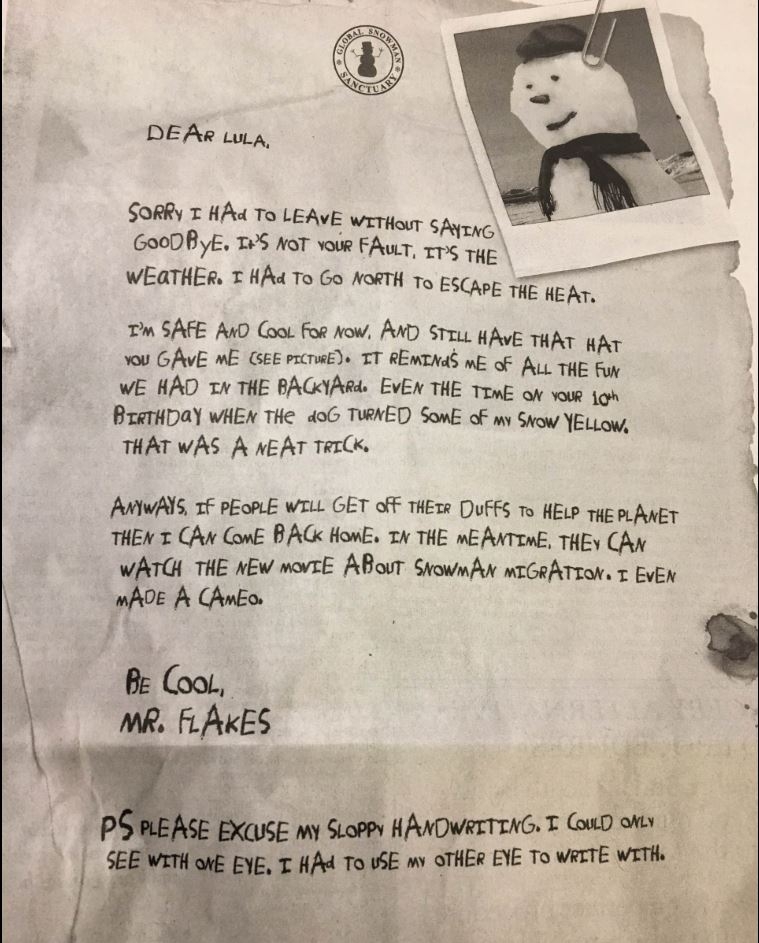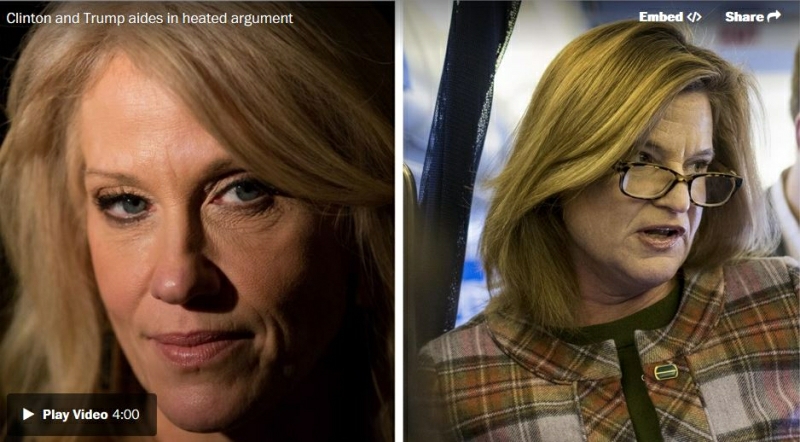Japanese Ad Exec Resigns After Employee Suicide
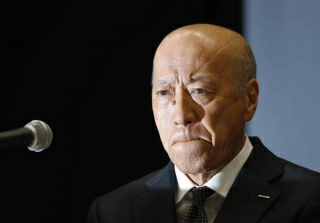 The president of Dentsu Inc., Japan's largest advertising agency, resigned because of an overworked employee's suicide last year. In a news conference, Tadashi Ishii said, "We deeply regret failing to prevent the overwork of our new recruit. I offer my sincere apology." He also said, "Although we took various countermeasures, the issue of overwork has not been improved. I will take full responsibility."
The president of Dentsu Inc., Japan's largest advertising agency, resigned because of an overworked employee's suicide last year. In a news conference, Tadashi Ishii said, "We deeply regret failing to prevent the overwork of our new recruit. I offer my sincere apology." He also said, "Although we took various countermeasures, the issue of overwork has not been improved. I will take full responsibility."
According to an executive at the firm, 24-year-old Matsuri Takahashi was forced to work long hours and underreport her time. She died by jumping from a high floor of the company's living quarters.
An employee who watched the news conference said, "His stepping down is a natural decision to prevent the company's image from deteriorating further." Resigning is common in these situations in Japan.
Discussion:
- Employees seem skeptical that the company will change, but they are turning out the lights at 10 pm to encourage people to stop working and go home. What else could they do to change the culture of overwork?
- Advertising firms in the United States have a similar reputation for long hours. Why do you think that's the case?
- Under what, if any, circumstances would you take a job that requires 100 hours of work each week?
WSJ's Best and Worst Ads of 2016
 The Wall Street Journal rounds up the best and worst ads of the year under the article title, "The Things We Can't Unsee." Among the winners are Sprint's ad starring Paul Marcarelli, a long-time Verizon promoter ("Can you hear me now?") and, of course, Mountain Dew's Puppymonkeybaby.
The Wall Street Journal rounds up the best and worst ads of the year under the article title, "The Things We Can't Unsee." Among the winners are Sprint's ad starring Paul Marcarelli, a long-time Verizon promoter ("Can you hear me now?") and, of course, Mountain Dew's Puppymonkeybaby.
The Mountain Dew video garnered almost 28 million views on YouTube. I wonder how many people are watching it multiple times.
On the loser list are a Wells Fargo pitch, which BizCom in the News featured, discouraging teens from pursuing the arts, and one I missed this year: a short Sprint ad that calls T-Mobile "ghetto."
Another offensive ad was on a billboard for "X-Men Apocalypse." The ad showed Jennifer Lawrence's character being strangled. People don't take domestic violence references lightly.
Discussion:
- What's your view of The Wall Street Journal's list? Which ads do like?
- Do you find the Sprint and X-Men ads offensive?
Retailers Sued for Fake Sales
 When is a sale not really a sale? Macy's, Kohl's, JCPenney, and Sears are facing lawsuits for "false reference pricing"-showing prices as "regular," "list," or "original" when they never were. According to the Consumerist:
When is a sale not really a sale? Macy's, Kohl's, JCPenney, and Sears are facing lawsuits for "false reference pricing"-showing prices as "regular," "list," or "original" when they never were. According to the Consumerist:
Under California law, retailers are prohibited from advertising an alleged former price of an item less the alleged former price was the prevailing market price within three months of the advertisement, or unless the date when the former price was in effect is clearly advertised.
To this end, the city [Los Angeles] claims that thousands of "sale" items were advertised at false reference prices.
In other words, items marked on sale were never sold at the so-called "original" price, and that's a misrepresentation.
The Los Angeles attorney who filed the suits said, "Customers have the right to be told the truth about the prices they're paying–and to know if a bargain is really a bargain. My office will fight to hold retailers responsible for their practices and to ensure consumers can make informed choices when spending their hard-earned money."
Checkbook.org brought a similar suit against some of these retailers in 2015. At that time, Sears made this statement:
"Sears disagrees with any suggestion that its pricing is misleading or deceptive. Sears is focused on providing its members with great prices on a wide variety of products and services," adding that it "complies with applicable pricing and advertising laws."
"... as a multi-channel, leading integrated retailer we are uniquely positioned to provide discounts to our members and customers in a number of different, legally compliant ways, including things like member pricing, store or online only promotions, clearance offers, and offers from third-party marketplace sellers," the statement said. "It is unfortunate that Checkbook.org did not appear to take these factors into account before making its assumptions."
Discussion Starters:
- How are you influenced by advertised "sales"?
- How believable do you find the two statements from 2015? What defense will the retailers bring to this suit?
Hyatt Regency Apologizes for Comments About a Name
 When Karim Abouelnaga, CEO, Practice Makes Perfect, checked into a Hyatt Regency, the woman at the front desk laughed at his last name. He tweeted to the hotel about the situation and received a message in return, a call from the hotel manager, and an apology note with a few gifts, shown here. Abouelnaga's LinkedIn post received almost 66,000 likes as of today, and more may come.
When Karim Abouelnaga, CEO, Practice Makes Perfect, checked into a Hyatt Regency, the woman at the front desk laughed at his last name. He tweeted to the hotel about the situation and received a message in return, a call from the hotel manager, and an apology note with a few gifts, shown here. Abouelnaga's LinkedIn post received almost 66,000 likes as of today, and more may come.
The apology note is a good example of a handwritten note, discussed in the introduction of Chapter 6. They are so rare that one can differentiate you and your business from others, as this example shows.
Discussion:
- What do you think about the initial interaction with the front desk? Should the agent have known better? How can this be avoided in the future?
- How well did Hyatt Regency respond? Some might think they went over the top. What's your view?
Resumes for Inexperienced Applicants
Business Insider recommends good advice for students and others with little work experience. For a resume, this video suggests focusing on accomplishments and highlighting social media skills, which could be coveted by employers.
But other advice may be outdated or inappropriate. For example, including a goal or objective at the top of your resume may not be necessary your interest is clear on your cover letter or if you're applying for a job through your school's on-campus recruiting program. In both cases, the job you want is obvious.
Career website The Muse goes further, suggesting an objective only when you're making a major career change-not for students, as Business Insider suggests, and Cleverism recommends the same.
Discussion:
- Which advice in the video do you find most and least helpful? What, if anything, contradicts what you have learned in the past?
- What other advice would you give to a high school student creating his or her first resume?
JPMorgan Slide Needs Explanation
JPMorgan CEO Jamie Dimon and others didn't understand a slide about the bank's strategy. Daniel Pinto, head of the corporate and investment bank, presented the slide to Dimon and others. According to Business Insider, Dimon said of the chart: "no one understood, including myself at the time."
The slide is part of a longer presentation about the corporate and investment banking division. In an interview with Business Insider, Pinto explains the chart:
"This is fully loaded ROE for all the business lines in fixed income. This is what we produce. This line is the cost of capital, and every single business, on a fully loaded basis, is delivering a return ahead of the cost of capital, except for commodities, which is going through a process of adjustment. The most important part is if you were to eliminate one of those, not all of the capital goes away, not all of the cost goes away, so essentially the marginal impact, the ROE you would lose by closing the business, is far higher than 15%. That's why, for me, the completeness is very important."
Discussion:
- To what extent does Pinto's explanation help you understand the chart?
- Should an executive use a chart that's difficult to understand intuitively? What should you consider in making this decision? Consider the audience, setting, etc.
Yahoo Responds to Data Breach (Again)
This is second post with the same title for BizCom in the News; the first was in September-just a few months ago.
For this data breach, the company again used Tumblr to communicate with users. This post has bold headings, but the messages are similar.
Reuters reports this is the biggest data breach in history, affecting 1 billion users. The stock dropped 6%, and Verizon is renegotiating its terms to buy the company. Verizon has threatened to sue if Yahoo refuses to reduce the purchase price,
The Reuters article quotes experts with harsh comments about the company:
- "Yahoo has fallen down on security in so many ways I have to recommend that if you have an active Yahoo email account, either direct with Yahoo of via a partner like AT&T, get rid of it."
- "Considering the repeated cases of data theft, users should look more closely at which services they want to use in the future and security should play a part in that decision."
In addition to its blog post, a Yahoo spokesperson commented, essentially rephrasing part of the Tumblr post: "We're committed to keeping our users secure, both by continuously striving to stay ahead of ever-evolving online threats and to keep our users and platforms secure."
Discussion:
- How do you think this news will affect Yahoo users? Does it change your opinion of the company? Does the fact that Yahoo is a technology company influence your opinion?
- How well does the Tumblr post address users' concerns?
- Should the Yahoo spokesperson have said something different when questioned by the Reuters reporter? What might have worked better?
Facebook Gets Serious About Fake News
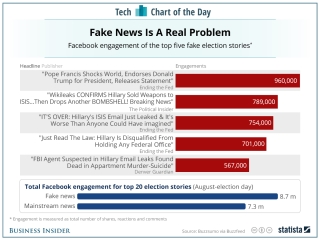 Facebook is getting serious about addressing fake news on its site. The issue came to a head when an armed man fired a shot in a pizzeria, believing a story about Hillary Clinton ran a child sex ring there.
Facebook is getting serious about addressing fake news on its site. The issue came to a head when an armed man fired a shot in a pizzeria, believing a story about Hillary Clinton ran a child sex ring there.
First, Facebook is partnering with outside fact checkers ABC News, The Associated Press, FactCheck.org, Politifact, and Snopes, who will review a story identified as possibly untrue. Stories that don't pass muster will be flagged as "disputed," will show lower down on a newsfeed, and will carry another warning if people want to share it.
In a post on its website, Facebook explained the changes in text, with images from the app, and in this video.
Although Mark Zuckerberg has downplayed the issue as only 1% of Facebook posts, he clearly see the company's responsibility. He wrote a post of his own to explain how they're taking action, and the company's post ends, "It's important to us that the stories you see on Facebook are authentic and meaningful. We're excited about this progress, but we know there's more to be done. We're going to keep working on this problem for as long as it takes to get it right."
Discussion:
- What's your view of this approach? Will these strategies work? What else, if anything, should they do?
- How well is Facebook communicating these changes? Review the blog post text, images, and video.
Mixed Conclusions in EPA Fracking Report
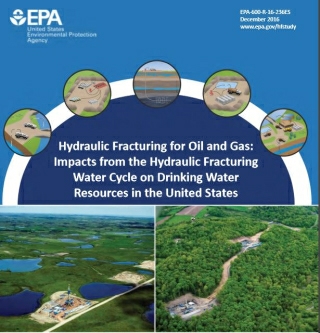 A CBS news article says the Environmental Protection Agency's latest report on fracking "raises more questions than answers." The report concludes, "EPA found scientific evidence that hydraulic fracturing activities can impact drinking water resources under some circumstances. The report identifies certain conditions under which impacts from hydraulic fracturing activities can be more frequent or severe."
A CBS news article says the Environmental Protection Agency's latest report on fracking "raises more questions than answers." The report concludes, "EPA found scientific evidence that hydraulic fracturing activities can impact drinking water resources under some circumstances. The report identifies certain conditions under which impacts from hydraulic fracturing activities can be more frequent or severe."
However, the abstract also includes, "Data gaps and uncertainties limited EPA's ability to fully assess the potential impacts on drinking water resources locally and nationally. Because of these data gaps and uncertainties, it was not possible to fully characterize the severity of impacts, nor was it possible to calculate or estimate the national frequency of impacts on drinking water resources from activities in the hydraulic fracturing water cycle."
Although detailed conclusions may fall short, the agency is trying to make the message accessible by providing a few versions. The website provides a list of all communications related to the study. A fact sheet provides a visual of the fracking process and gives an overview of the findings and how the report can be used.
Discussion:
- Which principles from Chapter 10 in the text does the report follow? Which are not followed?
- How do you assess the findings? How does the report affect your thinking about fracking?
- To what extent do you find the fact sheet useful? How does it fall short?
Company Examples for Chapter 1: Understanding Business Communication (Ethics, Legal, and Technology)
Notre Dame Students Walk Out on VP Pence's Commencement Address (May 2017)
About 100 students left the stadium as Vice President Pence delivered his commencement speech. An interesting class discussion could focus on the ethics of their decision and their rationale, which they give in a statement.
Choate Apologizes for History of Abuse (April 2017)
This may be a tough topic for class, but Choate's open letter is interesting. I found it defensive, but maybe students would disagree.
Princess Cruises Apologizes for Oil Dumping (December 2016)
Princess Cruises, owned by Carnival, published several messages to apologize for illegally dumping oil-contaminated waste into the ocean. The company's communications certainly are prolific, but how honestly do they admit wrongdoing, and how well do they rebuild the brand?
A comment posted on YouTube under the president's video sums up one perspective: "[T]his video needs taking down and a new one with someone who looks sorry is put up. [H]er reading of this is terrible, like watching a 12yr old at a school play." (The writer needs to take one of our classes! But students might agree with his assessment.)
These examples can be used to discuss persuasive strategies (Chapter 7), oral presentations (Chapter 11), and ethics (Chapter 1):
"Bridgegate" Emails Confirm Guilt (November 2016, 2013)
I don't shy away from political topics, and the scandal of NJ Governor Chris Christie's staff closing a bridge lane is a good illustration of how email causes legal trouble. In November 2016, two of his associates were found guilty of creating traffic problems on the George Washington Bridge to retaliate against the Trenton, NJ, major. The email shown here is the most damning evidence in the case. The link, above, includes a written response from Christie and an interview.
Mylan CEO Defends Pricing (August 2016)
The EpiPen may save your life if you have an allergic reaction, but you'll pay a steep price for it. In this interview, Mylan CEO defends a $400 increase over five years. This is an ethical situation and can be used with Chapter 7 to discuss persuasive strategies.
Older Examples
Collection of companies' social media policies.
Apple's (leaked) social media policy.
Great email exchange by two lawyers (discussed in Chapter 1). Useful to discuss ethics, tone, and more. Here's a PowerPoint file to reveal the messages, and you can read more about the situation here.
Excerpts of Goldman Sachs emails (topic in Chapter 1) collected by the Wall Street Journal. As the WSJ reporter says, "The [Senate] committee will likely use many of the emails to illustrate Goldman's sometimes contradictory and unflattering statements about its role in the mortgage meltdown." Read more here.
National Labor Relations Board's memo about social media policies, 2012.
General Mills statement reverting back to its original legal terms.
A general's email about the value of reading. Read more about the situation.
Facebook communications: Communicating Our Community Standards and Guidelines, 2015.
Former Twitter CEO Dick Costolo's posts taking responsibility for cyberbullying on the site, 2015.
Browse News by Chapter
A Tough Interview
 A New York Times article compliments CNN reporter Jake Tapper for an "uncompromising" interview with Vice President-elect Mike Pence. After criticism of most TV anchors, including a soft-ball interview by Matt Lauer of Trump in September, the article is an action call to others covering the election and presidency.
A New York Times article compliments CNN reporter Jake Tapper for an "uncompromising" interview with Vice President-elect Mike Pence. After criticism of most TV anchors, including a soft-ball interview by Matt Lauer of Trump in September, the article is an action call to others covering the election and presidency.
The toughest issue was about Michael G. Flynn, the son of Trump's pick for national security adviser, Lt. Gen. Michael T. Flynn. The younger Flynn has an active social media life and has been spreading rumors, such as the one about Hillary Clinton running a child sex ring out of a Washington, D.C., pizzeria, where a man, believing the story, appeared and fired a shot. Michael G.'s relationship to the administration came into question when Trump's transition team pursued security clearance for him.
Tapper pushed Pence during the interview eight times, saying, "I want to move on to other issues, but I'm afraid I just didn't get an answer." Pence called Tapper's questions a "distraction" and talked about the public's satisfaction with the president-elect's decisive action.
Tapper tried again: "You're downplaying his role, but you must be aware of the transition team putting forth security clearance." Pence says he was helping with scheduling.
Tapper again: "Are you aware that a security clearance...?" Pence finally admitted something about "paperwork.
It's a frustrating interview to watch.
Discussion Starters:
- How well did Pence handle the questioning? Should he have handled it differently?
- The New York Times writer says this type of questioning should be the norm, not the exception. Do you agree?
- Has TV reporting changed over time? Have reporters gotten less aggressive, as some claim? If so, why do you think this is the case?
More About Carrier and Cyberbullying
President-elect Trump seems to be firming up opponents and supporters, simply reinforcing what voters felt before the election. His move to save Carrier jobs from relocating to Mexico has been criticized as a political ploy and a dishonest representation of the deal.
The president of the local Steelworkers Union and a member of the negotiating team, Chuck Jones, said Trump's claim of saving 1,100 Indiana jobs was inflated: 350 of those jobs were never intended to move.
 A New York Times article questions Trump's response, which experts describe as dangerous:
A New York Times article questions Trump's response, which experts describe as dangerous:
- Anybody who goes on air or goes public and calls out the president has to then live in fear that he is going to seek retribution in the public sphere. That could discourage people from speaking out. (Frank Sesno)
- It's beneath the dignity of the office. He doesn't seem to understand that. (Robert Dallek)
- When you attack a man for living an ordinary life in an ordinary job, it is bullying. It is cyberbullying. This is a strategy to bully somebody who dissents. That's what is dark and disturbing. (Nicolle Wallace)
Discussion Starters:
- What's your view of Trump's behavior on Twitter? This has been going on since the beginning of the election process. Should he stop now, or is that a personal decision he gets to make?
- The initial news about saving jobs seems to have been inflated. How does that influence your view of Trump's negotiation as a success story?
Is Sears Doomed?
 Yahoo Finance sees little hope for Sears. For years, the retailer has been closing stores and now it seems to be on its last leg. Declining sales caused the company to close 80 stores in July and another 64 through December.
Yahoo Finance sees little hope for Sears. For years, the retailer has been closing stores and now it seems to be on its last leg. Declining sales caused the company to close 80 stores in July and another 64 through December.
CFO Jason Hollar remains optimistic:
We understand the concerns related to our operating performance. We have fallen short on our own timetable for achieving the profitability that we believe the company is capable of generating. With that said, the team remains fully committed to restoring profitability to our company and creating meaningful value.
This next sentence is a lesson in business jargon:
We believe that our liquidity needs will be satisfied through the foreseeable future using the levers available to us through our portfolio of assets.
In other words, they still have stuff to sell off (like brands) to keep the company afloat-perhaps not the best strategy. A failing company that sells its profitable bits is taking a big risk. The CEO of a retail consultancy doubts anything can save the business:
[T]he funds raised are not being used to develop of growth the firm - they are being used to prop up an ailing and failed business.
In our view, it is now too late to turn this around. It is just not financially feasible to reverse it.
How long can this drag on? BizCom in the News posts in 2011 and 2014 also focused on Sears store closings.
Discussion Starters:
- What are the Sears' executives communication choices at this point? They can continue to prop up the brand image, or . . . what are some other options? Assess the potential consequences of each
- Am I too harsh about Hollar's comment? If you were advising him to use simple or "plain" language, what would you suggest he say instead? You might consider a little emotional appeal as well.
- Hollar mentioned Kenmore as a potential sales opportunity. What's Sears without Kenmore?
Comms About the Oakland Warehouse Fire
 Oakland city officials and others are commenting on the "Ghost Ship" warehouse fire that killed at least 36 people who gathered for a concert party. A refrigerator may have caused the fire, but the building was under investigation for illegal living areas and potentially hazardous garbage on the property. A press release from the City of Oakland gives some history:
Oakland city officials and others are commenting on the "Ghost Ship" warehouse fire that killed at least 36 people who gathered for a concert party. A refrigerator may have caused the fire, but the building was under investigation for illegal living areas and potentially hazardous garbage on the property. A press release from the City of Oakland gives some history:
The last permitted use of the building was as a warehouse. On November 13, 2016, the City of Oakland received complaints of blight and unpermitted interior construction at the building. On November 17, 2016, a City building inspector visited the property and verified the blight complaint, but could not gain access to the building to confirm the other complaint regarding unpermitted construction. This is an ongoing investigation.
Members of the police department, sheriff's office, and others held a news conference on Sunday:
Reporting has been painful, as more bodies have been found, most people in their 20s and 30s. We don't yet know whether the warehouse owners or Ghost Ship managers will be charged. One of the managers, Derick Ion Almena, said of the tragedy: "They're my children. They're my friends, they're my family, they're my loves, they're my future. What else do I have to say?" Later, he posted, "Confirmed. Everything I worked so hard for is gone. Blessed that my children and Micah were at a hotel safe and sound ... it's as if I have awoken from a dream filled with opulence and hope ... to be standing now in poverty of self worth."
A New York Times article blames rising housing prices in the Bay Area and in other cities in the United States:
The victims died because they were trapped in a tinderbox. Yet the economic backdrop of the tragedy is also important because it shows how rising rents and fears of eviction can push vulnerable people in a desperate search for housing to unsafe spaces.
For some artists, Ghost Ship offered a rarity: a place to work and sleep.
Discussion Starters:
- Almena was criticized for his first comment, which sounded cold. What else should he have said?
- Assess the news conference speakers. What advice would you give them for improving crisis communications and presentation delivery?
Catchy "Save Our Snowmen" Campaign
The organization Cool Effect has a clever ad campaign, including a full-page in this Sunday's New York Times calling for a "Global Snowman Sanctuary."
In a video, Cool Effect takes a fun approach to bringing attention to climate change. The organization is using crowdfunding to support projects that reduce carbon emissions. A summary on the video explains:
More than 4,000 species of snowmen are threatened every year by climate change. In 2016 alone, large Avalanches of snowmen have been seen migrating thousands of miles away from their yards of origin to colder climates. With safe havens like The Global Snowman Sanctuary few and far between, we need your help to provide a cold shelter from the excruciating warmth. The planet can't wait and neither can they.
In an interview with the Yale Climate Connections group, Cool Effect CEO Marisa de Belloy said, "One differentiator from existing climate change conversation is our method of communication."
Discussion Starters:
- What's your reaction to the group's communication? How is it different from other climate change initiatives?
- What are the potential risks of this approach? Consider a few downsides and how the strategy might backfire.
Campaign Debrief Gets Heated
A postmortem campaign session at Harvard University's Kennedy School of Government "erupted into a shouting match," according The Washington Post. Hillary Clinton's communications director Jennifer Palmieri blasted the Trump campaign:
"If providing a platform for white supremacists makes me a brilliant tactician, I am proud to have lost. I would rather lose than win the way you guys did."
Palmieri was emotional during the discussion; the Post reported that she "choked up at various points of the session."
Kellyanne Conway, Trump's campaign manager, took her share of shots:
"Guys, I can tell you are angry, but wow. Hashtag he's your president. How's that? Will you ever accept the election results? Will you tell your protesters that he's their president, too?"
Discussion Starters:
- What's your view of the exchange? In what ways is this discussion productive, and how did it fall short?
- Someone on the Trump team said of the Clinton team, "You guys are pathetic." Do you agree? Is this just about "sour grapes"?
- Are people still saying "hashtag"?
Princess Cruises Admits Dumping
 Princess Cruises, a division of Carnival, will pay $40 million in penalties for illegally dumping oil-contaminated waste into the ocean. The Department of Justice announced the news and called the activity "deliberate":
Princess Cruises, a division of Carnival, will pay $40 million in penalties for illegally dumping oil-contaminated waste into the ocean. The Department of Justice announced the news and called the activity "deliberate":
Princess Cruise Lines Ltd. (Princess) has agreed to plead guilty to seven felony charges stemming from its deliberate pollution of the seas and intentional acts to cover it up. Princess will pay a $40 million penalty-the largest-ever criminal penalty involving deliberate vessel pollution-and plead guilty to charges related to illegal dumping of oil contaminated waste from the Caribbean Princess cruise ship.
Assistant Attorney General Cruden had harsh words for the company:
The pollution in this case was the result of more than just bad actors on one ship. It reflects very poorly on Princess's culture and management. This is a company that knew better and should have done better. Hopefully the outcome of this case has the potential not just to chart a new course for this company, but for other companies as well.
Princess Cruises responded extensively in a statement posted on the website, in an FAQ, and in videos from the company executives. The president's video blames a few employees. A comment posted on YouTube under the video sums up one response: "this video needs taking down and a new one with someone who looks sorry is put up. her reading of this is terrible, like watching a 12yr old at a school play."
Discussion Starters:
- Read the company's statement and watch the videos. How well do the executives respond to the crisis? What could they have done differently?
- Does this news affect your decision to take a Princess Cruise? Why or why not?
Olive Oil Companies Sue Dr. Oz
 Dr. Oz is in trouble again for possible false claims. The TV personality is featured in the textbook in Chapter 9 for promoting products without evidence that they work. Now, an olive oil trade association, North American Olive Oil Association (NAOOA), is suing him for attacking the industry.
Dr. Oz is in trouble again for possible false claims. The TV personality is featured in the textbook in Chapter 9 for promoting products without evidence that they work. Now, an olive oil trade association, North American Olive Oil Association (NAOOA), is suing him for attacking the industry.
On his show, Dr. Oz said, "[A] shocking 80% of the extra virgin olive oil that you buy every day in your supermarket isn't the real deal," and "It may even be fake. Most of the olive oil in your pantry might be a scam." But Dr. Oz used taste tests, which Eryn Balch, a NAOOA representative said aren't an accurate way to determine product quality and purity.
A Forbes article explains the issue:
The problem with the study and its interpretation is twofold: 1) Sensory taste tests cannot detect purity and 2) The number of samples was small and hardly representative of the marketplace, testing only three specimens each of fourteen imported and five California brands. "It got misinterpreted, and it just spread," Balch said. Even the New York Times got it wrong, with an infographic claiming that 69% of all imported olive oils are "doctored," even though the Olive Center report showed no such thing. The Times eventually corrected its mistake but the damage was already done. "It's been five years now, and it's still spreading," Balch said.
Dr. Oz was most recently in the news because a group of doctors signed a petition to have him removed from his position at Columbia University Department of Surgery. He also made headlines for promoting a weight loss program without proven evidence. His impact is sometimes called the "Dr. Oz Effect" because his claims sell a lot of product.
Discussion Starters:
- Dr. Oz will fight the suit, of course. What claims and evidence will he use to make his case?
- What does it take to convince you to buy a new product or stop buying a product you have been using? Consider principles from Chapter 7 on persuasion: logical argument, emotional appeal, and credibility. To which do you most respond?
Starbucks Gets a New CEO
 Starbucks CEO Howard Schultz will become chairman of the company and leave the CEO job to Kevin Johnson, who has served as chief operating officer for the past two years. This is a big move for the company that Schultz bought in 1987 and led through tremendous growth since.
Starbucks CEO Howard Schultz will become chairman of the company and leave the CEO job to Kevin Johnson, who has served as chief operating officer for the past two years. This is a big move for the company that Schultz bought in 1987 and led through tremendous growth since.
With the change, Schultz announced plans to open at least 20 Roastery premium coffee stories, which have been successful in Seattle. Schultz says the concept "has become widely recognized as the world's most immersive, coffee-forward retail experience."
In a news release and on a media conference call, Schultz says he'll shift his focus to retail innovation. Some speculate an interest in politics, but we'll see about that.
Johnson complimented Schultz on his leadership-to be expected during this type of transition:
I do want to acknowledge the obvious: Howard Schultz is among the world's most iconic leaders and entrepreneurs. I know Howard doesn't personally think of himself that way, but as his business partner and friend, I know this to be true. It is a privilege to work side-by-side with Howard. I have great confidence in our strategy, the partnership that we have developed, and the world-class talent we have assembled.
The Wall Street Journal reports that the decision is not based on data:
But the big bet is based solely on Mr. Schultz's instinct that it is the right thing to do. "There was no research," he said. Convincing his board and senior management team to create another brand wasn't easy.
Discussion Starters:
- Read the news release and media conference call script. What key messages do you take away?
- What's your view of the decision? Should Schultz have more data to justify the move, or are his instincts enough?
- The photo is a Starbucks Roastery store. What do you think of the design? Consider the target market.





